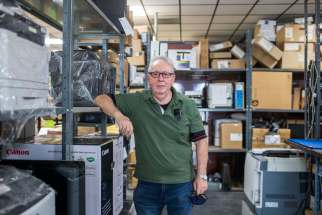Shift… return The last typewriter repairman in the city has been enjoying something of a renaissance lately
Read this article for free:
or
Already have an account? Log in here »
To continue reading, please subscribe:
Monthly Digital Subscription
$0 for the first 4 weeks*
- Enjoy unlimited reading on winnipegfreepress.com
- Read the E-Edition, our digital replica newspaper
- Access News Break, our award-winning app
- Play interactive puzzles
*No charge for 4 weeks then price increases to the regular rate of $19.00 plus GST every four weeks. Offer available to new and qualified returning subscribers only. Cancel any time.
Monthly Digital Subscription
$4.75/week*
- Enjoy unlimited reading on winnipegfreepress.com
- Read the E-Edition, our digital replica newspaper
- Access News Break, our award-winning app
- Play interactive puzzles
*Billed as $19 plus GST every four weeks. Cancel any time.
To continue reading, please subscribe:
Add Free Press access to your Brandon Sun subscription for only an additional
$1 for the first 4 weeks*
*Your next subscription payment will increase by $1.00 and you will be charged $16.99 plus GST for four weeks. After four weeks, your payment will increase to $23.99 plus GST every four weeks.
Read unlimited articles for free today:
or
Already have an account? Log in here »
Hey there, time traveller!
This article was published 26/08/2021 (1570 days ago), so information in it may no longer be current.
Blame it on Tom Hanks.
Izu Gephter is the I.G. in I.G. Office Equipment Ltd., an office-equipment repair depot at 1119 Henderson Hwy. For years, Gephter, 74, who runs things with his 44-year-old, computer-technician son Sheldon and their “go-to guy” John Keays, was hard-pressed to see a single typewriter, manual or electric, in a month, interest in the clickety-clack contraptions had waned so much.
It’s been a slightly different story ever since Hanks, a typewriter devotee with 250 artifacts in his personal collection, discussed his hobby in a well-received 2016 documentary called California Typewriter and, following that, with a reporter from the New York Times.
Before you could say “carriage return bar,” people of all ages were following the two-time Academy Award-winner’s lead by scooping up aged typewriters online, or blowing the dust off specimens that had been resting in a basement or garage for years, hopeful they could find somebody… anybody to breathe new life into them.
That’s where Gephter, believed to be the last professional typewriter repair person in Winnipeg, comes in.
Last week alone, Gephter refurbished a mint green, Hermes typewriter for a fellow in his 20s whose intention is to use it to write poetry, and another, a classic black Underwood, for a Beausejour woman in her 50s who plans to display it in her living room as a piece of folk art.
“It’s been interesting, to say the least,” says the soft-spoken septuagenarian, who repaired his first typewriter at age 18. “For the longest time, I spent the majority of my days fixing printers, fax machines, computers… all the other stuff we handle here. Lately, however, typewriters have become practically my full-time job again, from people wanting to — how do you say? — unplug.”
●●●
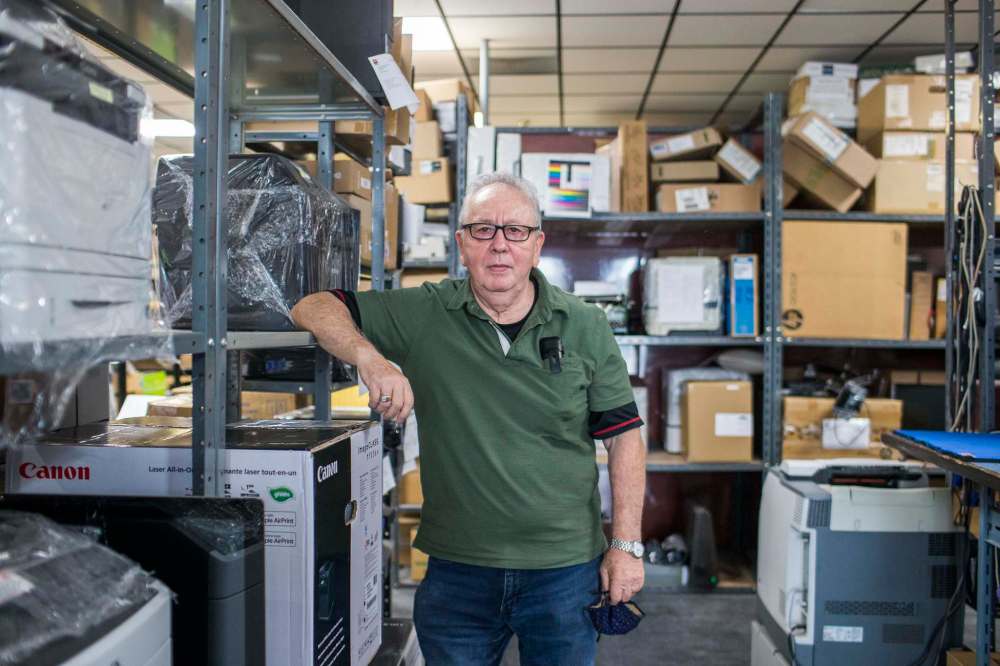
Gephter was born in Baku, Azerbaijan. A Russian Jew, he never knew his two older siblings. Both died during the Second World War, so his parents considered themselves blessed when he came along in 1947, he says with a gentle smile. The three of them moved to Chernivtsi, a city of 265,000 in western Ukraine, when he was 11 months old. It was there where Gephter, a talented soccer player in his youth, landed a full-time position fixing typewriters at age 18 for the princely sum of 150 rubles, approximately C$3, a day.
He never complained. If it hadn’t been for the fact his mother and father were in their 60s when he finished school — in his case, trade school — he would have automatically been drafted into the military. Owing to their advanced age, however, he was granted an exemption as the breadwinner of the family.
Gephter may not have known a carriage from a paper rest his initial day on the job, but thanks to experienced co-workers who obligingly answered all his questions, he became adept at the trade rather quickly. Here was the thing, though: replacement parts were pretty much non-existent in their corner of the world. That meant if he was staring down at a typewriter with a broken strike bar — the thin, moveable part that carries the letters or characters — he had no choice but to weld and solder a new piece from scratch.
“I enjoyed the challenge, and that’s probably why I never went looking for something else,” he comments matter-of-factly, seated on a wheeled task chair parked next to an industrial work bench, his “office” he calls it.
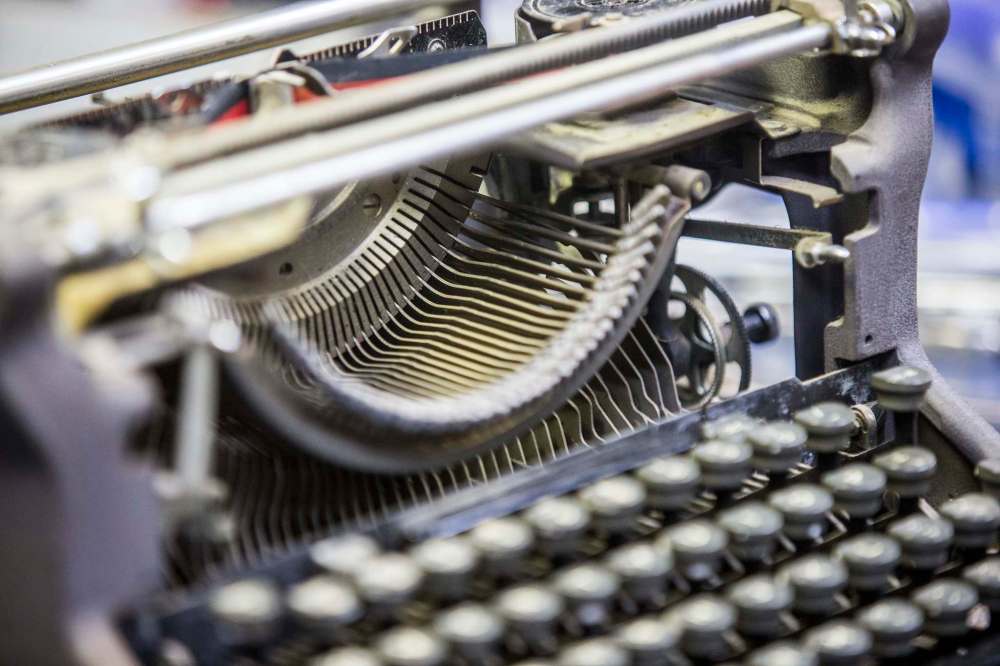
He was 30 years old, married with two young children, when he heard of Winnipeg for the first time. His father-in-law, who had moved here at the behest of his sisters, was imploring the rest of the family to join them in Canada.
“I couldn’t speak a word of English, Russian is my first language, and I remember landing in Montreal, unable to communicate with anybody to figure out how to catch our connecting flight,” he says, shaking his head. “We made it, of course, but it was far from easy.”
Gephter barely had time to unpack his suitcase before reporting for work. His brother-in-law, who was living here as well, had put in a good word for him with a manager he knew at National Typewriter and Office Equipment on Portage Avenue. Within hours of moving into a residence on Powers Street, near Selkirk Avenue, he was trying to figure out a bus schedule to report to his new job.
He laughs, recalling how one of his supervisors addressed the language barrier by parking a radio and “huge speaker” near his work station, keeping it tuned to CJOB morning, noon and night. Gephter didn’t have a clue what the announcers were saying, of course, but after taking a two-month English course at Red River College, he steadily caught on.
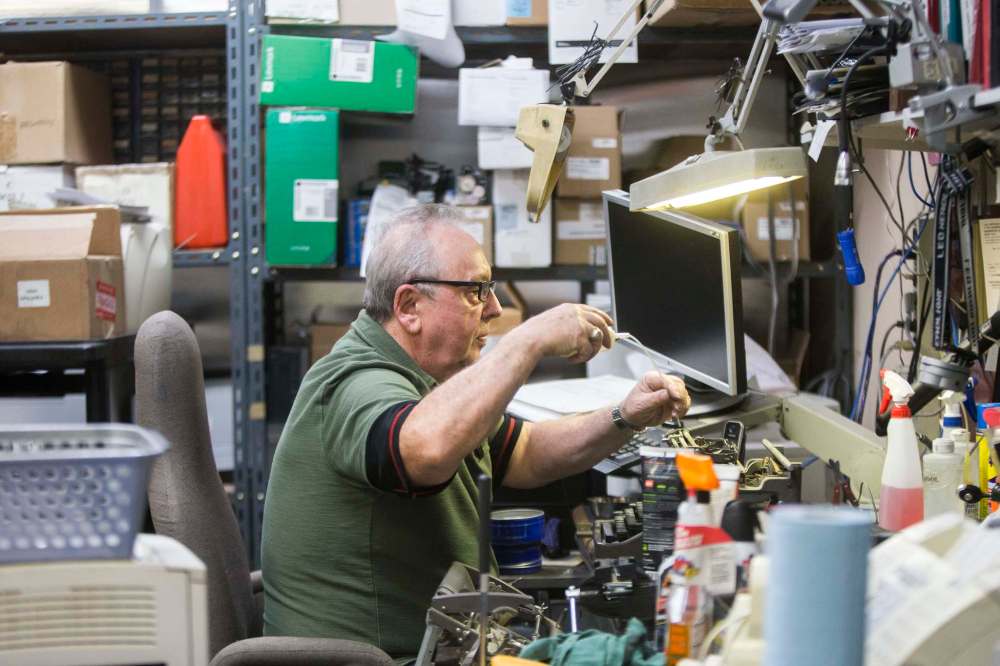
The biggest difference between his job in Winnipeg versus that in Ukraine — aside from the fact all the keys were suddenly different — was that he no longer had to scramble for parts. Simply open a drawer or walk to a supply cabinet and, like magic, he had pretty much everything he needed to complete the task at hand.
“There were six or seven us at National Typewriter at the time, I was probably the second-youngest there, and it was go, go, go all the time. We had contracts with offices all over the city, it was a great time to be in the typewriter business,” he says, noting he became the last typewriter repair person standing about two years ago, when “great guy” John Tavares, founder of JFT Typewriters and Office Equipment, hung up his screwdrivers and spring hooks for good.
For his part, Sheldon remembers tagging along with his father to work at the age of 12, and being taught a few basics such as how to change a ribbon and polish keys. By the time he took typing at Garden City Collegiate, he was comfortable enough with the machines that he was regularly repairing classroom ones, a talent that endeared him to his teacher, he says with a wink.
The elder Gephter struck out on his own in 1998, a few years after National Typewriter became Nat/Com, and not long before the company closed altogether in the early 2000s. Like he mentioned earlier, typewriter repair jobs were few and far between for a while, though they never dried up entirely.
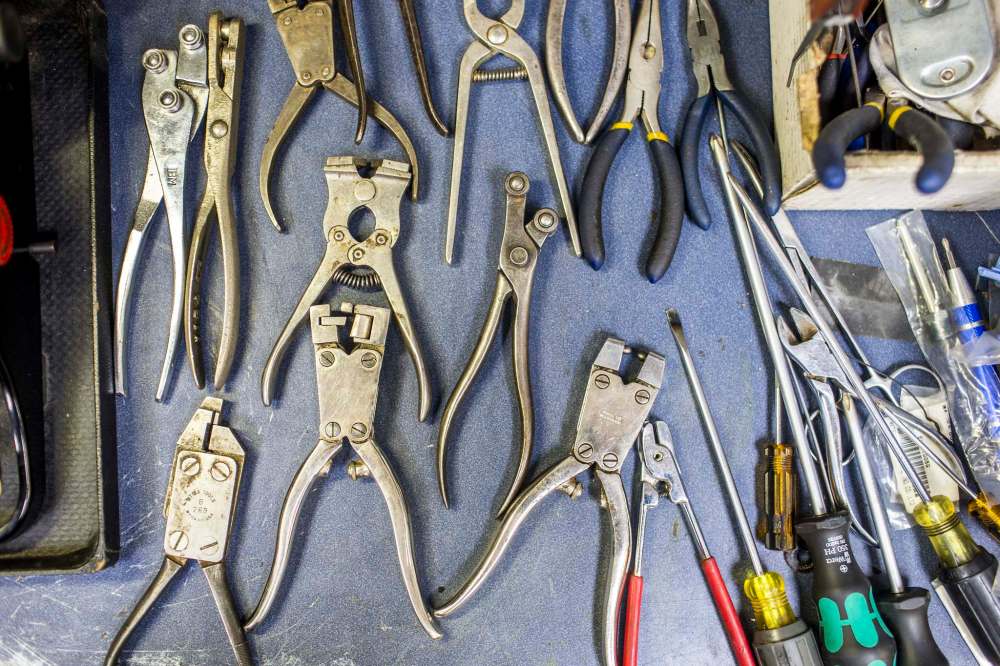
“Even today there are a few law firms and travel agencies in town that continue to rely on typewriters for certain size forms,” Sheldon says. “We have one long-time customer, a home-renovations guy, who keeps a portable typewriter in his vehicle, to type invoices out on. It’s such a crucial part of his business that he can’t afford to leave it with us for a week when it’s malfunctioning. We tell him to go for lunch and that my dad will get to it, quick as he can.”
It was just his type
It’s safe to assume Liam Speirs, son of longtime Winnipeg Free Press columnist Doug Speirs, has typewriter ribbon ink coursing through his veins.
That could be the reason the younger Speirs, 34, was admittedly agog two years ago when he spotted his maternal grandfather’s old typewriter, a contraption he recalls pounding away on when he was three or four, in a box in a corner of parents’ basement. Could he have it, he asked? Be their guest, came the reply.
It’s safe to assume Liam Speirs, son of longtime Winnipeg Free Press columnist Doug Speirs, has typewriter ribbon ink coursing through his veins.
That could be the reason the younger Speirs, 34, was admittedly agog two years ago when he spotted his maternal grandfather’s old typewriter, a contraption he recalls pounding away on when he was three or four, in a box in a corner of his parents’ basement. Could he have it, he asked? Be their guest, came the reply.
“It was in pretty rough shape, the dusts of time had definitely settled on it, but conveniently for me there was nothing structurally wrong with it,” Speirs says. “I’ve always been somewhat mechanically inclined and after consulting a number of forums online dedicated to typewriters, I got some tips on how to clean it out etc. Before long it was good as new.”
Speirs has since added to his lot; he currently has between 10 and 15 typewriters, in various states of disrepair. Calling them the “laptops of their day,” he says he’s drawn to the simplicity of them, how if you service each regularly there’s no good reason it can’t last for decades.
“I write letters to friends and family on them and, also — this is going to sound lame for a 34-year-old — use them to recreate historic documents the Government of Canada would have sent to other nations,” he says. “My friend’s dad is really into military paraphernalia and I recreated Canada’s declaration of war for the Second World War, which I presented to him as a gift, along with a typewritten letter. He thought it was pretty cool.”
Since embarking on his new pastime, Speirs has encountered others around his age who are into typewriters, too, people who pick them up for $10 or $20 at a flea market or Goodwill, then, the same as him, do their utmost to bring them back from the dead.
“I guess it’s that whole, ‘everything-old-is-new-again’ thing. There’s no novelty to them if you’re in your 50s or 60s, but for people my age, they’re interesting and neat at the same time. Plus, they definitely make you think about what you want to put down on paper. It’s not like you can rely on auto-correct, right?”
— Dave Sanderson
Fifty-plus years into his career, Gephter doesn’t tire of punching the clock bright and early each morning, primarily because he’s never sure what the day is going to bring. He’s currently putting the finishing touches on a 1929 model that was gummed up something fierce after going untouched for years. And last week, he spent an entire afternoon, in his son’s words, “MacGyvering” a German make for which parts were impossible to come by. Luckily it was similar to ones he’d worked on in Ukraine, so he was never in doubt he’d be able to get it working again.
“The biggest problem is I’m getting old and it’s not as easy to hold the tools and see the smaller parts as it once was,” he says, adding he never bothered learning how to touch type; he’s a two-finger typist, always has been, always will be.
“I still take as much pride in my work today as I did 55 years ago,” he goes on. “I felt so bad a month ago when I couldn’t fix this one typewriter a woman brought in because it was in such rough shape that I gave her one of my own.”
On her way out the door, he thanked her for dropping by, reminding her if she ever needed it looked at in the future, she would know where to find him.
david.sanderson@freepress.mb.ca
Dave Sanderson was born in Regina but please, don’t hold that against him.
Our newsroom depends on a growing audience of readers to power our journalism. If you are not a paid reader, please consider becoming a subscriber.
Our newsroom depends on its audience of readers to power our journalism. Thank you for your support.
History
Updated on Thursday, August 26, 2021 9:20 PM CDT: Corrects business address
Updated on Thursday, August 26, 2021 11:46 PM CDT: fixes typos






